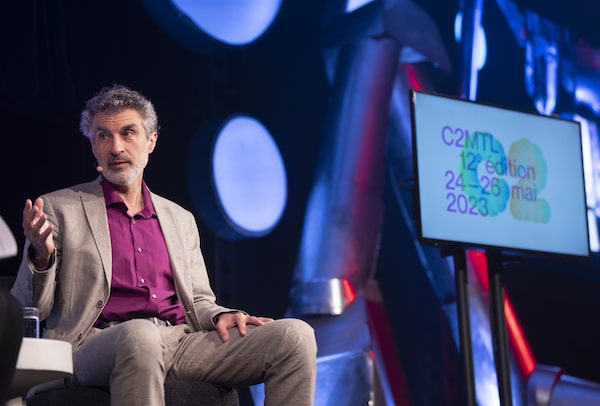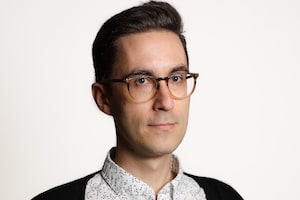
Yoshua Bengio, seen at conference in Montreal on May 24, 2023, has become more alarmed over the past year about the rapid pace of AI development.Christinne Muschi/The Canadian Press
Artificial-intelligence expert Yoshua Bengio urged Ottawa on Monday to quickly implement a bill to regulate AI and guard against serious dangers posed by the technology, saying that a registry is needed to monitor powerful systems and that national-security and societal risks should be addressed in the legislation.
“Rejecting it or delaying its adoption much more would be taking a terrible risk with the public’s protection,” Prof. Bengio wrote in his prepared remarks to the House of Commons industry and technology committee.
The committee is studying Bill C-27, which includes the Artificial Intelligence and Data Act (AIDA), a framework for regulating AI systems first introduced by the federal Liberal government in June, 2022. The act would be in force no sooner than 2025, according to Innovation, Science and Economic Development Canada (ISED).
Prof. Bengio, a computer science professor at the Université de Montréal and scientific director of the Mila AI research institute in Quebec, has become more alarmed over the past year about the rapid pace of AI development. Systems that are as smart as humans, known as artificial general intelligence or AGI, were previously thought to be decades or even centuries away, he said. “Superhuman AI could be developed in the next two decades, and even possibly in the next few years,” he told the committee on Monday.
More powerful AI systems can benefit humanity through advances in health care and productivity, he said, but can also be abused by bad actors or even turn rogue and outsmart humans. Prof. Bengio said the government should prohibit systems that can give advice on producing biochemical and biological weapons, as well as those that can help design cyberattacks and deceive or manipulate humans.
“We currently have no reliable way of predicting when superhuman capabilities will emerge, which greatly diminishes our ability to prepare against a catastrophic threat when it unfolds,” he wrote in his prepared remarks.
Prof. Bengio said AIDA should include a provision to create a mandatory national registry for companies and labs developing powerful AI systems. Developers would be required to share information about their systems even before the model is fully trained, including efforts to ensure their models are safe.
This requirement would apply to the most advanced AI systems, which require immense computing power, and which only a handful of developers are capable of building.
The proposal is identical to one introduced in U.S. President Joe Biden’s executive order on AI last October. Gillian Hadfield, a University of Toronto law professor, has also proposed that Canada create a registry for large AI models.
But a registry is only a first step, according to Prof. Bengio. A regulator should eventually be empowered to issue licences that would permit developers to release their models to the public.
Canada will have to scale up its AI expertise to do so effectively, said Elissa Strome, executive director of the pan-Canadian AI strategy at the Canadian Institute for Advanced Research. “For us to be able to develop the skills, the tools and the expertise to really interrogate these advanced AI systems … we’re going to also need very significant computational powers in Canada,” she told the committee. “That’s a critical component.”
Some of Prof. Bengio’s concerns about AI, particularly that the technology can pose a catastrophic or even existential risk to society, are considered outlandish by some other experts in the field. The notion of AGI is controversial, too, and some experts still consider superhuman AI to be both a fantasy and a way for tech companies to generate hype. (Meta Platforms Inc. chief executive Mark Zuckerberg said recently he wants to build AGI, for example.)
AIDA was conceived before high-profile researchers such as Prof. Bengio – who received the prestigious Turing Award in 2018 for his research, along with emeritus University of Toronto professor Geoffrey Hinton and Meta’s Yann LeCun – started speaking out about their fears of how AI could threaten humanity. AIDA so far focuses on the capabilities of AI today, not hypothetical threats that could emerge in the future.
The bill is designed to mitigate economic, physical and psychological harm to Canadians from “high-impact” AI systems. According to amendments proposed by Industry Minister François-Philippe Champagne, that includes algorithms used to make determinations related to employment, health care and content moderation on search engines and social media. A commissioner would be created to oversee and enforce the law, and the most serious violations could result in fines of up to $25-million or 5 per cent of the offending company’s global revenue.
AIDA has been roundly criticized since its introduction in 2022. Business groups have said the act is too vague, while opposition MPs have charged it gives too much power to bureaucrats to craft regulations behind closed doors. Civil-society organizations have said the government did not conduct any public consultations before the act was introduced, and that ISED’s more recent consultations have skewed heavily toward industry groups. Some experts, including Jim Balsillie, have argued AIDA should be scrapped.
Prof. Bengio, who also serves as co-chair of ISED’s AI advisory council, rejected the idea of delaying or starting over with AIDA in an interview with The Globe and Mail before his testimony. “It’s okay to have an imperfect law,” he said. “We should pass the law as quickly as possible, and not try to cram every little detail of what we want or don’t want in it.”
AIDA is designed to be flexible, he added. If the bill is enacted, new regulations can be written to more quickly address emerging issues, which is crucial given how fast the science of AI is advancing.
To that end, Prof. Bengio said there should be international co-ordination, including from Canada, on research to prevent superintelligent AI from turning against humans. “This is an open scientific problem. It should be as important as the Manhattan Project, or even more so, because it’s about the future of humanity,” he said.
 Joe Castaldo
Joe Castaldo